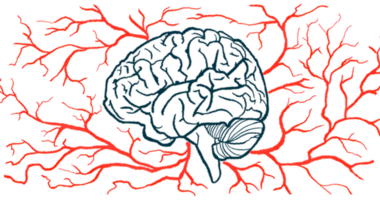Receptor may link gut microbiome to immune system in MS: Study
New research may lead to tools to fine-tune immune responses

The aryl hydrocarbon receptor (AHR) may facilitate or “tune” the crosstalk between the gut microbiome and the immune responses that have been implicated in multiple sclerosis (MS), a new study found.
Deleting this receptor in a set of immune T-cells — a suspected factor in MS onset and progression — resulted in better recovery in an MS model due to a reduction in inflammatory T-cells and alterations in microbiome metabolism.
According to the researchers, treatment with taurocholic acid, one of the metabolites that were increased in mice lacking the receptor, or a fecal transplant from the engineered mice both eased MS disease severity in animals with normal AHR function.
“We are approaching the search for multiple sclerosis therapeutics from a new direction,” Andrea Merchak, a PhD candidate in neuroscience at the University of Virginia (UVA), and the study’s first author, said in a university press release.
“By modulating the microbiome (the collection of microorganisms that naturally live inside us), we are making inroads in understanding how the immune response can end up out of control in autoimmunity,” Merchak said, adding, “We can use this information to find early interventions.”
Studying the link between the gut microbiome and immune responses
The research findings were detailed in a study, “The activity of the aryl hydrocarbon receptor in T cells tunes the gut microenvironment to sustain autoimmunity and neuroinflammation,” published in PLOS Biology.
In recent years, a connection has been established between the microbes living in the intestinal tract — collectively called the gut microbiome — and immune system function.
Gut dysbiosis, a dysregulation in the normal balance of bacteria, fungi, and viruses in the gut, is observed in MS patients and has been linked to earlier disease onset and increased disease severity in mouse models of the disease.
While a number of microbe supplements, or probiotics, may offer benefit, how they might work to influence immune function is not entirely clear.
“A better understanding of the cross-talk between the immune system and the microbiome is required to translate these findings to the clinic,” the researchers wrote.
AHR is a receptor implicated in the regulation of immune system signaling. This receptor, whose activity can be influenced by metabolites derived from the microbiome, is found at lower numbers in MS patients. Moreover, modulations to AHR in mice yield notable microbiome changes.
Now, a team of researchers from the Center for Brain Immunology and Glia, part of UVA’s School of Medicine, investigated the potential role of AHR in modulating MS, particularly in relation to the microbiome.
In a first set of experiments, the team used healthy mice and mice genetically engineered to lack AHR in CD4-positive T-cells, an immune cell type implicated in MS. These animals underwent the standard protocol to induce an MS-like disease, known as experimental autoimmune encephalomyelitis (EAE).
Results showed that mice lacking AHR had a similar time to disease onset and peak clinical severity as healthy mice, but recovered more quickly than healthy mice in the chronic phase.
The researchers noted that this difference in recovery was only observed when the mutant mice were housed separately from their healthy counterparts. This likely was due to microbiome differences that were only apparent when the mice lived separately and didn’t influence each other’s microbiomes, the team noted.
The AHR-deficient mice exhibited fewer T-cells in their spinal cords during this chronic disease stage. The mice also showed corresponding signs of increased apoptosis, a type of cell death, that was particularly affecting CD4-positive immune cells.
Researchers use mouse models, cell cultures in lab
Th17 cells are one type of CD4-positive cell that have been especially implicated in MS. When microbial metabolites were obtained from AHR-deficient mice and added to cell cultures of healthy Th17 cells, the cells began to undergo apoptosis to a greater degree than when exposed to metabolites from healthy mice.
Analyzing the microbiome more closely, researchers identified a distinct metabolic profile.
Bile acids were particularly increased in the mutant mice, with one of these metabolites, taurocholic acid, found to be 10 times more elevated than in control mice. These metabolic products are often found at low levels in MS patients, but adding them to the diet is enough to reduce disease severity in mouse models of the disease.
In cell cultures, taurocholic acid was found to induce Th17 cell apoptosis. Moreover, when healthy mice were treated with taurocholic acid for seven days after EAE induction, disease onset was delayed and peak clinical scores were decreased.
Healthy mice transplanted with fecal matter from the mutant mice exhibited a similar, but less pronounced, reduction in disease severity.
Data overall indicate, “a bidirectional communication between T cells and the microbiome via AHR,” the researchers wrote. “As we further understand the complexities of harnessing the gut microbiome, we predict tools for controlling … microbe modulation will be a new frontier for therapeutics.”
Merchak noted that while probiotics can be challenging to use clinically due to their non-specificity, the AHR can “easily be targeted with medications, so we may have found a more reliable route to promote a healthy gut microbiome.”
“Ultimately, fine-tuning the immune response using the microbiome could save patients from dealing with the harsh side effects of immunosuppressant drugs,” Merchak concluded.








